7 Methodological Guides of non road mobile machinery
The Climate and Clean Air project in Latin American Cities Plus (CALAC+) pursues a vision of healthier cities that seek to reduce their emissions of pollutants and greenhouse gases (GHGs) by encouraging a shift to soot-free, low-carbon city buses and non-road mobile machinery.
These technical documents are developed by CALAC+ to promote knowledge and environmental management of machinery emissions reduction in Latin America. The topics covered include the generation of inventories, estimation of pollutants, emission control systems, regulatory standards policies and monitoring of measures adopted.
The Methodological guide for developing the non-road mobile machinery inventory provides a standardized vision to be used by decision makers to encourage the creation and regular updating of inventories for the adoption of measures that reduce environmental and health impacts.
The Methodological guide for estimating emissions from non-road mobile machinery completes the first guide and provides the background and rationale for estimating emissions from this fleet.
The Methodological guide for developing “soot-free” policies for non-road mobile machinery aims at taking the opportunity to implement policies and regulatory measures. These measures should prioritise a significant reduction of soot in diesel emissions, given its toxicity and climate change impact.
The Good practice guide on the use of DPF systems in non-road mobile machinery proposes a number of measures associated with emission aftertreatment of refitted or new engines with DPF (Diesel Particulate Filter) so as to ensure their emission reduction properties over the lifetime of construction machinery engines.
The Guide for selecting the machinery fleet for retrofit develops the selection procedure based on technical, economic, protocol compliance and machinery use criteria.
The Guide for controlling and supervising DPF-retrofitted fleets provides a general framework for minimizing DPF system failures and consequently their impact on emissions generated. A new or retrofitted engine with DPF is much more reliant on maintenance to ensure its operation.
The Methodological guide for drafting technical terms of reference for the acquisition of DPF systems for retrofitting non-road mobile machinery is intended to be a reference document, which should be adapted to the provisions of law in each case, with technical and contractual requirements and recommendations to ensure good performance of DPF systems.
